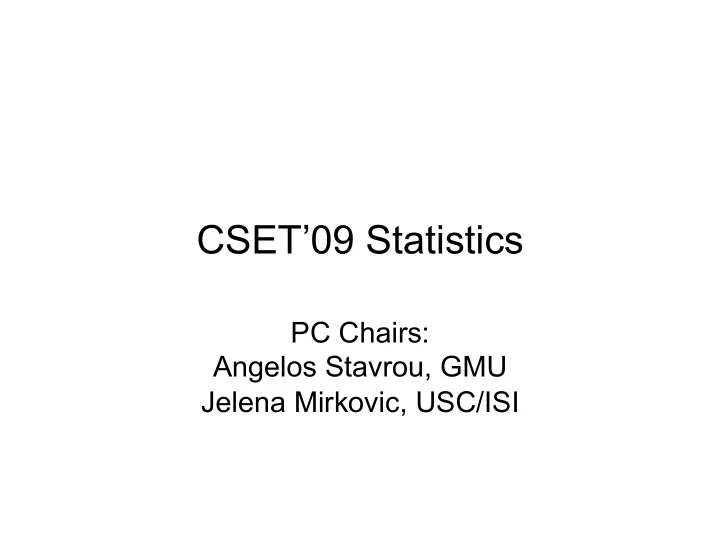

CSET’09 Statistics PC Chairs: Angelos Stavrou, GMU Jelena Mirkovic, USC/ISI
Program Committee • Paul Barford, University of Wisconsin • Andy Bavier, Princeton University • Matt Bishop, University of California, Davis • Thomas Daniels, Iowa State University • Sonia Fahmy, Purdue University • Carrie Gates, Computer Associates • Alefiya Hussain, SPARTA Inc. • Brent Kang, The University of North Carolina at Charlotte • Vern Paxson, ICSI • Sean Peisert, University of California, Davis • Peter Reiher, University of California, Los Angeles • Rob Ricci, University of Utah • Mark Stamp, San Jose State University • Kashi Vishwanath, Microsoft Research Thanks! Vinod Yegneswaran, SRI International •
Papers • 27 submitted 9 accepted • 3 papers clearly off topic, received 1 review • Remaining papers received at least 3 reviews, 1 received 4 – Telecon PC meeting, all decisions reached via a concensus between reviewers – Common problems in papers: novelty or timeliness for research papers, lessons learned/teaching experience for education papers • 4 more found off topic • 13 submissions about experimentation - 4 accepted • 5 submissions about testbeds/tools - 3 accepted • 4 submissions about education - 2 accepted • Eliminated COI by assigning reviews to PC members unrelated to any coauthor (no close collaborators, no same employer) – 2 submissions had a PC member as coauthor, these members stepped out of the PC meeting during their paper’s discussion – 1 was accepted, 1 was rejected • Confident that we selected best quality papers for the workshop
Program At a Glance 9:15 - 9.45 Keynote address: Michael Van Putte, DARPA 9:45 - 10:00 Break 10:00 - 11:00 2 papers on security education 11:00 - 12:00 2 papers on security experimentation 12:00 - 1:00 Lunch 1:00 - 2.30 3 papers on testbeds 2:30 - 2:45 Break 2:45 - 3.45 2 papers on experimentation tools 3:45 - 4:00 Break 4:00 - 5:30 Panel on science of security experimentation: • John McHugh, Dalhousie University • Jennifer Bayuk, Jennifer L Bayuk LLC • Minaxi Gupta, Indiana University • Roy Maxion, Carnegie Mellon University
Future of CSET • The number of submissions increased from last year – We expect this trend to continue, true for past three years – This should improve the acceptance rate • 25 out of 27 submissions were from people unrelated to DETER – We expect this ratio to increase, or stay the same • Testbeds are still not as widely used as we’d like – Many researchers are not aware of them, we expect this to change (GENI, NCR) • Ideally we’d like more submissions about: – Education, tools, experimental methodology, validating testbed results (but this greatly improved since last year) • Likely with USENIX Security again next year
Recommend
More recommend